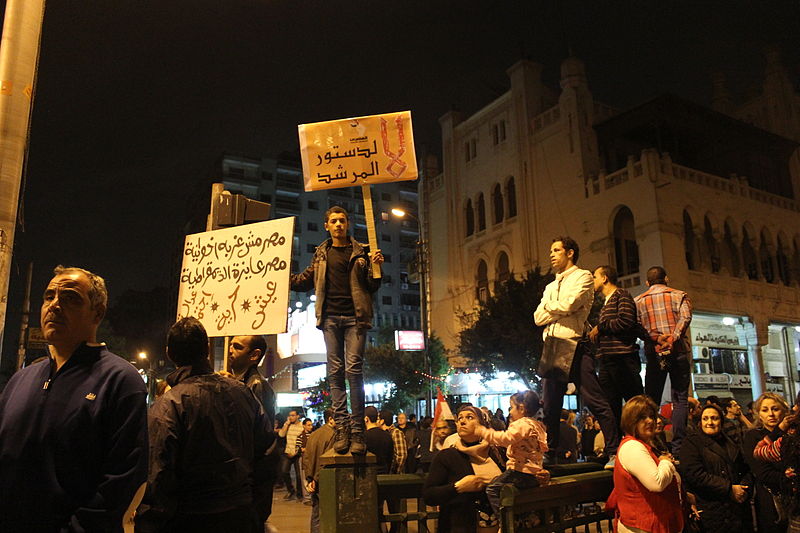Both Right and Wrong
Opposites are mutually exclusive, or so the prevalent logic goes. A ruler is either good for his people, or he is not. A piece of legislation either works, or it does not. A cause is either worth believing in, or it is not. This makes logical sense; but it does not work in practice. Opposites tend to go hand in hand in the category of world affairs, and choosing one side becomes difficult when the opposite is just as appealing. Two such sets of opposites have bothered me deeply lately. These opposites are so interesting because they are real; there is both a good thing and a bad thing, but the whole is not totally good or totally bad. The first such set of opposites relates to Egypt, the second relates to Israel. Both teach the same thing.
This November, Morsi assumed the title of deal broker of the Arab-Israeli conflict. This president, who refuses to talk to Israelis or even mention the name of their country, became their protector and confidant, arbitrating the ceasefire deal Israel signed with Hamas. Secretary of State Clinton congratulated Morsi on his “leadership” and “responsibility,” and much of the Western world was thankful that Morsi did not side Egypt with Hamas, the combatant in that conflict that he clearly sympathized with more. Assuming a similarly pragmatic role this summer, Morsi ordered a military operation to deal with Islamist perpetrators in the Sinai Peninsula that threatened both Israeli and Egyptian troops. This responsible, sensible Morsi did not appear to be the same one who grabbed so much power the very next day.
When Morsi assumed his dictatorial powers in late November, it was as if the entire legacy of the Arab Spring was in question. Possibly doing so to prevent the judiciary from declaring the Islamist-led constitution writing Constituent Assembly illegal, Morsi placed himself above the judiciary and gave himself the power to pass any law that would uphold the legacy of his version of the revolution. He became the most powerful leader of Egypt since pharaoh, and the protests that ensued as a result got so dire that tanks had to be sent out into the streets. The constitution, perhaps the last hope for a democratic Egypt, is still being written by a mostly Islamist group who the rest of the country fears will impose restrictions on Egyptians’ civil liberties. But this picture of Morsi the dictator conflicts with his image from just the day before.
Israel similarly acted in a seemingly disjointed way in the very same time period. During the war with Hamas in Gaza, Israeli military officials targeted only areas in Gaza that had confirmed militant Hamas operatives, and called off several attacks where it was questionable if the target was actually at the location. The Israeli Defense Forces made phone calls and dropped leaflets into Gaza to warn civilians to stay away from Hamas officials and leave areas that were about to be attacked. They trucked in goods and humanitarian supplies into Gaza during the fighting, aiding their enemy while attacking them. And, finally, they cooperated with the Egyptian-brokered ceasefire despite the fact that there were probably more Hamas targets that they wanted to destroy. Despite the death toll and the ugliness of war, Israel clearly made some committed humanitarian efforts and called off the war in the hope of saving lives.
A few days later, the picture changes. Following the announcement by President Mahmoud Abbas at the United Nations on November 29th that called for Palestine to be recognized as an observer nation, a vote that received overwhelming international support, the Israeli government announced the construction of new settlement building in the E1 area that connects East Jerusalem to Ma’aleh Adumim, effectively blocking the contiguity of any future Palestinian state. Instead of recognizing the legitimate Palestinian desire for a state, as per the two state solution, and supporting the UN move while simultaneously calling for Abbas to come to Jerusalem to work out actual statehood issues that cannot possibly be solved unilaterally, Israel responded by denying the Palestinian people this whole notion of legitimacy. As the world, including the U.S., criticized Israel’s actions, it became apparent that Israel was on the wrong moral and strategic side of this decision. The peacemaking of a few days before was nowhere to be found.
There can be two ways of approaching such inconsistencies. The first suggests reconciliation, that Morsi is not as responsible nor as dictatorial as he seems, that Israel is not as morally correct and morally incorrect as it seems, and that both issues, and others like them, really reflect a complicated balance of strategies and ideologies and practices that defines policymaking.
The other notion suggests not shying away from the inconsistency, but embracing it. One can see Morsi as both a responsible pragmatic arbiter, and a dictatorial Islamist leader, for he is both, and one can see Israel as responsible in its attempts to limit the casualties of a complicated war but also strategically shortsighted in building in E1, for both are true.
It is easier to unravel conflicting notions so that they no longer conflict than to live with the existence of conflict. The reality is that Morsi is both, and Israel is both. It is a difficult to internalize the notion that the Middle East, like the rest of the world, works in strange ways, and that a proper understanding of its workings demands simultaneous support and condemnation of the same person and the same place. But simplicity and peace of mind, after all, is no reason to distort the truth.

